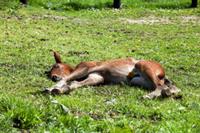Diagnosis, Treatment, and Prevention of Equine Gastric Ulcers

Gastric ulcers occur commonly in horses of all ages. Causes of the condition have typically been associated with feeding rates, stress, and the use of non-steroidal anti-inflammatory drugs (NSAIDs), but the exact cause of the condition remains unclear.
Diagnosis
While the determination of gastric ulcers involves several steps, the observable symptoms include:
- Poor appetite
- Restlessness
- Teeth grinding
- Excessive salivation
- Intermittent colic
- Kicking or biting at belly
- Diarrhea
- Lying down more than usual, or lying on the back
- Weight loss and poor body condition
- Depression
- Personality changes
- Reluctance to train
Even when a horse presents with multiple symptoms, the complete diagnosis needs to be based on information gathered from all of the following:
- Medical history
- Clinical signs
- Physical examination
- Laboratory tests
- Gastroscopy
Treatment
Once the diagnosis is made, treatment can begin. The duration for the treatment plan will vary depending upon the severity of the condition. Clients need to know that ulcers take a long time to heal, so the prescribed course of treatment needs to be continued even after the animal stops showing symptoms. Once the treatment is complete, a follow-up gastroscopy may be advised.
Stage One of Treatment:
- Remove any and all stressful conditions
- Discontinue any and all NSAIDs
Stage Two of Treatment:
- Administer medications which:
- Decrease acid production
- Buffer acid
- Protect the stomach lining
Stage Three of Treatment:
- Increase the amount of diet roughage
- Alfalfa is believed to have qualities that aid in the care of ulcers
- Decrease or remove altogether the amount of grain offered
- Add supplements to increase caloric content for animal, if needed
- Give probiotics to aid digestion
FDA Approval
The only FDA approved drug identified for the effective treatment of equine gastric ulcers is Omeprazole.
- Two anti-ulcer medications based on the use of Omeprazole have been created for use in the effective prevention and treatment of gastric ulcers
- Both products are FDA approved
- Gastrogard® is marketed for prescribed use in the treatment of diagnosed gastric ulcers
- Ulcergard® is an over-the-counter product for use in preventing gastric ulcers and for reducing the incidence of newly developing stomach ulcers
- Both are registered products of Merial Limited
Prevention
Because many factors are felt to be associated with the cause of gastric ulcers, clients can follow these tips to help prevent ulcers in their animals:
- Feeding rate
- A horse’s stomach produces acid continuously, so offering food in frequent smaller amounts helps to keep food in the stomach, eliminating acid accumulation that irritates the lining
- Avoid long periods for the horse to go without food
- Feed and exercise
- Offer hay free-choice
- Hay has been found to drop the acid level in the stomach
- Place feed bins on the ground
- Eating in the normal grazing position helps to stimulate saliva
- Offer opportunities for the horse to exercise and graze at will
- Never exercise a horse with an empty stomach
- Stress
- Mental and physical stress are felt to contribute to the creation of ulcers
- High-performance animals such as race or show animals can be helped by:
- Reducing stabling time
- Stabling animal with a companion animal
- Turning animal out on pasture between workouts
- Avoid long-term use of NSAIDs, when possible:
- Animals on a regimen of NSAIDs for more than ten days stand an increased risk of developing gastric ulcers
- Two NSAIDs that block the chemicals that decrease acid production are:
- Phenylbutazone (Bute)
- Flunixin melamine (Banamine)
Equine gastric ulcers are a major cause of illness in horses of all ages. Ensuring that animals have access to the correct food and right amount of exercise will help, but prevention also needs to include the removal of stress factors affecting the horse.
Want to know more about equine gastric ulcers? Contact your Covetrus representative for more information! We can be reached at 855.724.3461.
Careers
Are you looking for a place to let your talents shine? At Covetrus, we help our practitioner customers better serve their patients and take pride in providing the best customer experience possible. Search our open positions to see our available opportunities.
Newsletter
Stay current with what’s going on with Covetrus, subscribe to receive our newsletter and email communications. Subscribers will receive the latest information in practice management, sales and marketing, animal health, and more.


Leave a comment